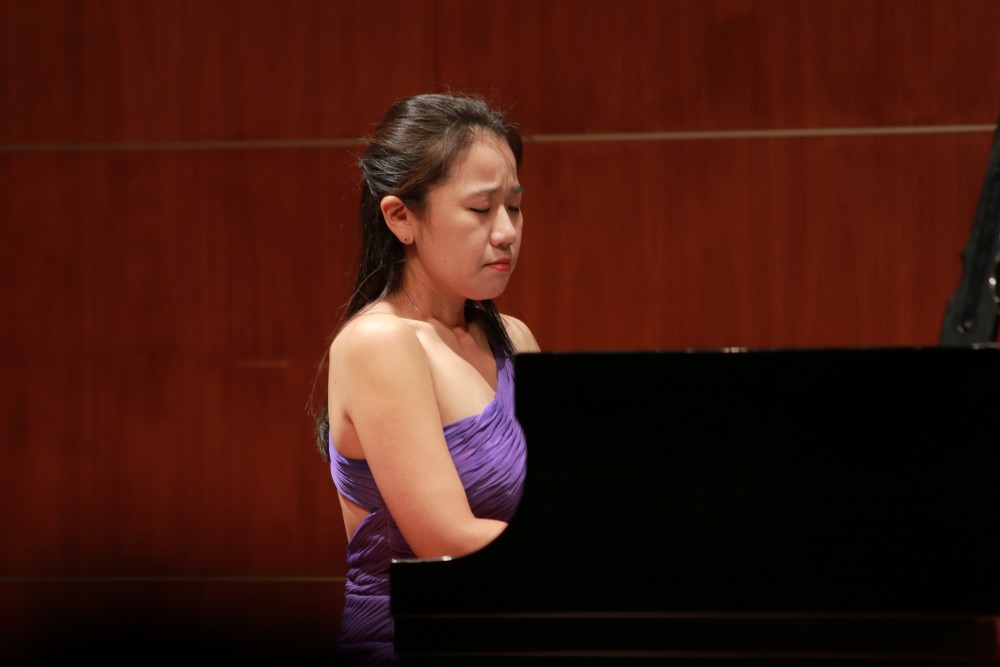Guest pianist provides classical perspective

Esther Park performs for students and faculty on Nov. 19 in Allendale, MI.
Nov 23, 2015
The room flooded with notes pouring from a single piano performer on the evening of Nov. 19 in the Sherman Van Solkema Recital Hall. Guest artist Esther Park spent two days at Grand Valley State University working with piano students and ended her visit with Thursday’s recital.
Assistant professor Sookkyung Cho said she invited Park to GVSU to help bring new perspective into the piano department and to give students a chance to see a skilled player.
“At any university, we tend to think of this as our world,” Cho said. “It was the same when I was in college. I think it’s really important to see what’s out there and that’s why I try to bring in guest artist. I hope that’s what (students) see that there’s a bigger world outside of GVSU, and there’s so much to explore out there.”
Park has performed as a soloist with orchestras in recitals all over the world. Park was born in Korea, moved to the United States at the age of 11 and went on to receive her undergraduate and graduate degree from Julliard School and recovered her Master of Musical Arts degree at the Yale School of Music.
Park is the winner of the 2013 Jose Roca International Piano Competition, the 2013 Russian International Music Competition and top prizes in other international piano competitions over the years. Currently, she is assistant professor of piano at East Tennessee State University.
Cho and Park met each other in college at Julliard School in 2001. They decided visit each other’s universities as guest artists and spend some time working with each other’s students. Park had the chance to teach a master class with GVSU students, working with them individually on ways to improve as a player.
“I’m working so closely with my students we sort of get into this groove, stuck in one spot, it’s hard to have perspective,” Cho said. “It’s always nice to have someone with a new perspective. That’s exactly what happened (during the master class), (Park) just fixed things here and there and instantly things were better. We might be looking at the same problem, but approaching it from a different perspective, different angle.”
In addition to the master class, Park’s recital on Thursday night allowed students to bring in their own perspective and their own interpretation to the music. Park performed “Kreisleriana, Op. 16” by Robert Schumann and “Images” by Claude Debussy. She said the Schumann piece being inspired by literature and the Debussy being inspired by paintings allowed students to “paint their own picture” in their minds and allowed her to feel more free as a performer.
“Schumann was a deeply literary guy and he was a writer himself and Debussy was deeply visual with color,” Park said. “I’m a bit of a free spirited person, so I love when composers give me a sort of free reign in the sense that the form. I feel like I can do more crazy things because somehow I feel it much freer. I’m not bound by all these rules or stereo-typical traditions.”
For Cho, the recital provided a chance for her students to see a skillful player perform pieces that are not often performed.
“As a player (Park) is able to bring such clarity from the keyboard,” Cho said. “Not only in technical terms, but clarity in structure, clarity in layers. It’s a very difficult thing to do because you’re working with 10 fingers with 88 keys, but it’s coming from one person, but you have to be three different people or sometimes four different people.
“I especially enjoyed Debussy because I could hear so many layers at the same time. Sometimes (Debussy) wrote in three staffs to indicate three lines and that’s exactly what I heard in her playing, and it’s sort of a magical thing.”
Cho said the recital also gave her students a place to hear live solo piano music. She said when she was in a musicology class, her teacher told her music was not music if you were simply listening to it or looking at a score. Instead, music meant a performance.
“We live in a great area, Grand Rapids is culturally very active, but I have also noticed that there are not that many solo piano recitals happening in the area that people can easily go to,” Cho said. “We have YouTube and we have recordings available online, but it’s just different. If it’s not being played then it’s not really music. When you go live performances, that’s when you feel what kind of power music has and it’s just a completely different experience than listening to the recording.”





















